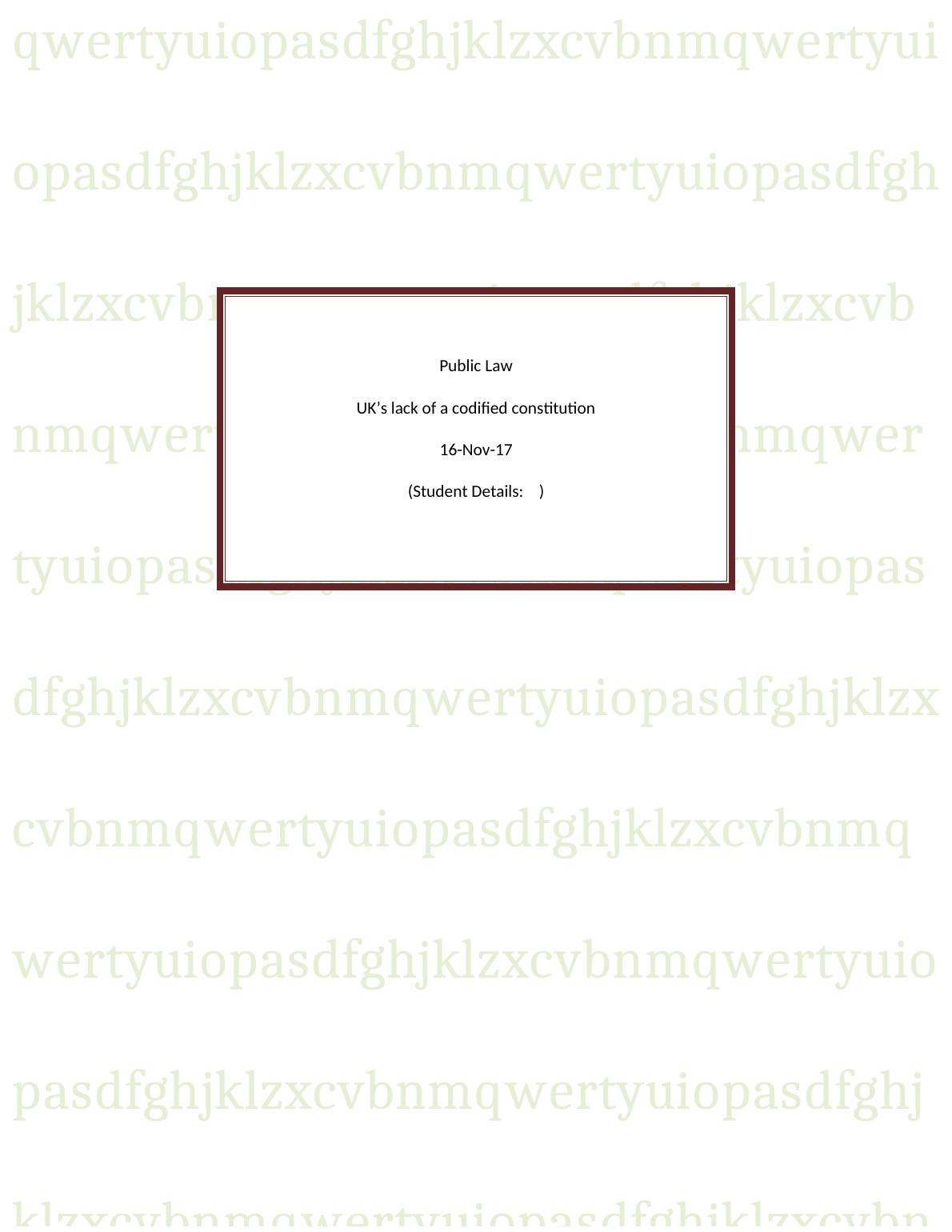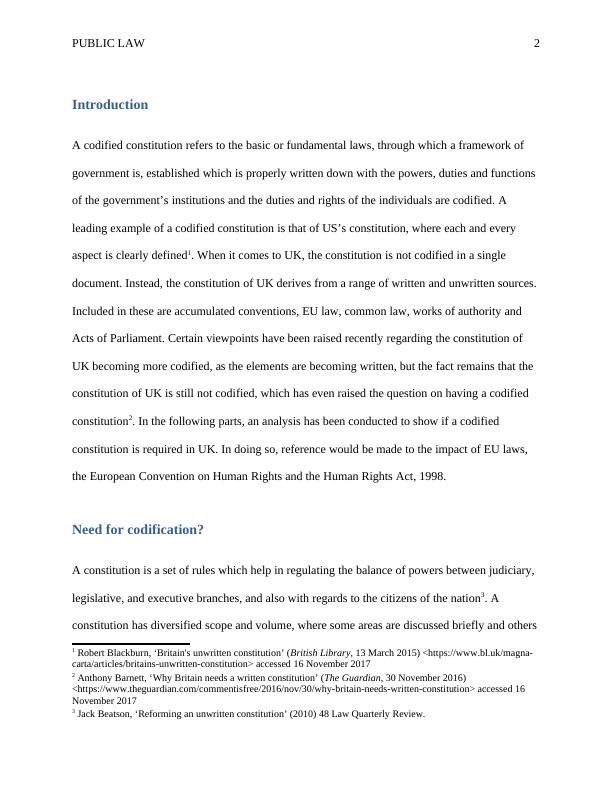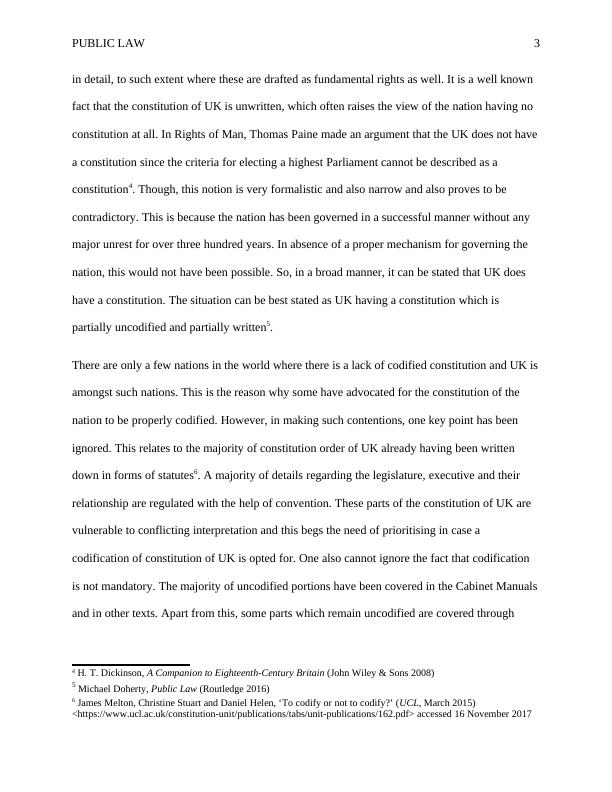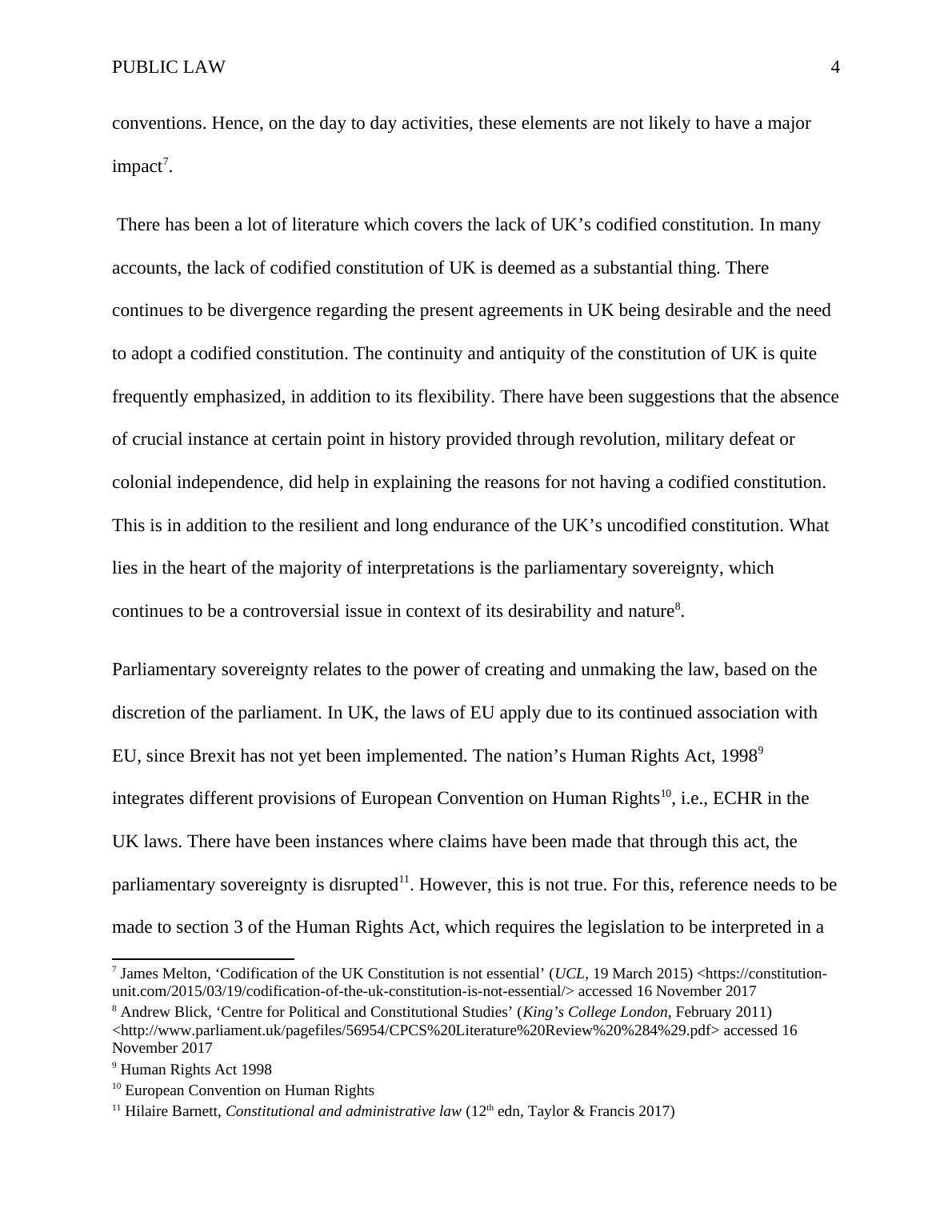Public Law Assignment (Doc)
11 Pages2608 Words45 Views
Added on 2020-04-15
Public Law Assignment (Doc)
Added on 2020-04-15
ShareRelated Documents
qwertyuiopasdfghjklzxcvbnmqwertyuiopasdfghjklzxcvbnmqwertyuiopasdfghjklzxcvbnmqwertyuiopasdfghjklzxcvbnmqwertyuiopasdfghjklzxcvbnmqwertyuiopasdfghjklzxcvbnmqwertyuiopasdfghjklzxcvbnmqwertyuiopasdfghjklzxcvbnmqwertyuiopasdfghjklzxcvbnmqwertyuiopasdfghjklzxcvbnmqwertyuiopasdfghjklzxcvbnmqwertyuiopasdfghjklzxcvbnmqwertyuiopasdfghjklzxcvbnPublic LawUK’s lack of a codified constitution(Student Details: )

PUBLIC LAW2Introduction A codified constitution refers to the basic or fundamental laws, through which a framework of government is, established which is properly written down with the powers, duties and functions of the government’s institutions and the duties and rights of the individuals are codified. A leading example of a codified constitution is that of US’s constitution, where each and every aspect is clearly defined1. When it comes to UK, the constitution is not codified in a single document. Instead, the constitution of UK derives from a range of written and unwritten sources. Included in these are accumulated conventions, EU law, common law, works of authority and Acts of Parliament. Certain viewpoints have been raised recently regarding the constitution of UK becoming more codified, as the elements are becoming written, but the fact remains that the constitution of UK is still not codified, which has even raised the question on having a codified constitution2. In the following parts, an analysis has been conducted to show if a codified constitution is required in UK. In doing so, reference would be made to the impact of EU laws, the European Convention on Human Rights and the Human Rights Act, 1998. Need for codification?A constitution is a set of rules which help in regulating the balance of powers between judiciary, legislative, and executive branches, and also with regards to the citizens of the nation3. A constitution has diversified scope and volume, where some areas are discussed briefly and others1 Robert Blackburn, ‘Britain's unwritten constitution’ (British Library, 13 March 2015) <https://www.bl.uk/magna-carta/articles/britains-unwritten-constitution> accessed 16 November 20172 Anthony Barnett, ‘Why Britain needs a written constitution’ (The Guardian, 30 November 2016) <https://www.theguardian.com/commentisfree/2016/nov/30/why-britain-needs-written-constitution> accessed 16 November 20173 Jack Beatson, ‘Reforming an unwritten constitution’ (2010) 48 Law Quarterly Review.

PUBLIC LAW3in detail, to such extent where these are drafted as fundamental rights as well. It is a well known fact that the constitution of UK is unwritten, which often raises the view of the nation having no constitution at all. In Rights of Man, Thomas Paine made an argument that the UK does not havea constitution since the criteria for electing a highest Parliament cannot be described as a constitution4. Though, this notion is very formalistic and also narrow and also proves to be contradictory. This is because the nation has been governed in a successful manner without any major unrest for over three hundred years. In absence of a proper mechanism for governing the nation, this would not have been possible. So, in a broad manner, it can be stated that UK does have a constitution. The situation can be best stated as UK having a constitution which is partially uncodified and partially written5. There are only a few nations in the world where there is a lack of codified constitution and UK isamongst such nations. This is the reason why some have advocated for the constitution of the nation to be properly codified. However, in making such contentions, one key point has been ignored. This relates to the majority of constitution order of UK already having been written down in forms of statutes6. A majority of details regarding the legislature, executive and their relationship are regulated with the help of convention. These parts of the constitution of UK are vulnerable to conflicting interpretation and this begs the need of prioritising in case a codification of constitution of UK is opted for. One also cannot ignore the fact that codification is not mandatory. The majority of uncodified portions have been covered in the Cabinet Manualsand in other texts. Apart from this, some parts which remain uncodified are covered through 4 H. T. Dickinson, A Companion to Eighteenth-Century Britain (John Wiley & Sons 2008)5 Michael Doherty, Public Law (Routledge 2016)6 James Melton, Christine Stuart and Daniel Helen, ‘To codify or not to codify?’ (UCL, March 2015) <https://www.ucl.ac.uk/constitution-unit/publications/tabs/unit-publications/162.pdf> accessed 16 November 2017

PUBLIC LAW4conventions. Hence, on the day to day activities, these elements are not likely to have a major impact7. There has been a lot of literature which covers the lack of UK’s codified constitution. In many accounts, the lack of codified constitution of UK is deemed as a substantial thing. There continues to be divergence regarding the present agreements in UK being desirable and the need to adopt a codified constitution. The continuity and antiquity of the constitution of UK is quite frequently emphasized, in addition to its flexibility. There have been suggestions that the absenceof crucial instance at certain point in history provided through revolution, military defeat or colonial independence, did help in explaining the reasons for not having a codified constitution. This is in addition to the resilient and long endurance of the UK’s uncodified constitution. What lies in the heart of the majority of interpretations is the parliamentary sovereignty, which continues to be a controversial issue in context of its desirability and nature8. Parliamentary sovereignty relates to the power of creating and unmaking the law, based on the discretion of the parliament. In UK, the laws of EU apply due to its continued association with EU, since Brexit has not yet been implemented. The nation’s Human Rights Act, 19989integrates different provisions of European Convention on Human Rights10, i.e., ECHR in the UK laws. There have been instances where claims have been made that through this act, the parliamentary sovereignty is disrupted11. However, this is not true. For this, reference needs to bemade to section 3 of the Human Rights Act, which requires the legislation to be interpreted in a 7 James Melton, ‘Codification of the UK Constitution is not essential’ (UCL, 19 March 2015) <https://constitution-unit.com/2015/03/19/codification-of-the-uk-constitution-is-not-essential/> accessed 16 November 20178 Andrew Blick, ‘Centre for Political and Constitutional Studies’ (King’s College London, February 2011) <http://www.parliament.uk/pagefiles/56954/CPCS%20Literature%20Review%20%284%29.pdf> accessed 16 November 20179 Human Rights Act 1998 10 European Convention on Human Rights11 Hilaire Barnett, Constitutional and administrative law (12th edn, Taylor & Francis 2017)

End of preview
Want to access all the pages? Upload your documents or become a member.
Related Documents
The Importance of a Codified Constitution in the UKlg...
|10
|3642
|63
The British Constitutional Order: Fusion of Power or Separation of Power?lg...
|8
|2280
|60
Law Assessmentlg...
|9
|1261
|63
Introduction to Public Law | Reportlg...
|11
|2619
|18
Constitution Helps The Protect Law Assignmentlg...
|10
|2437
|23
Independent Judiciary Protecting the Human Rightslg...
|7
|1913
|49
